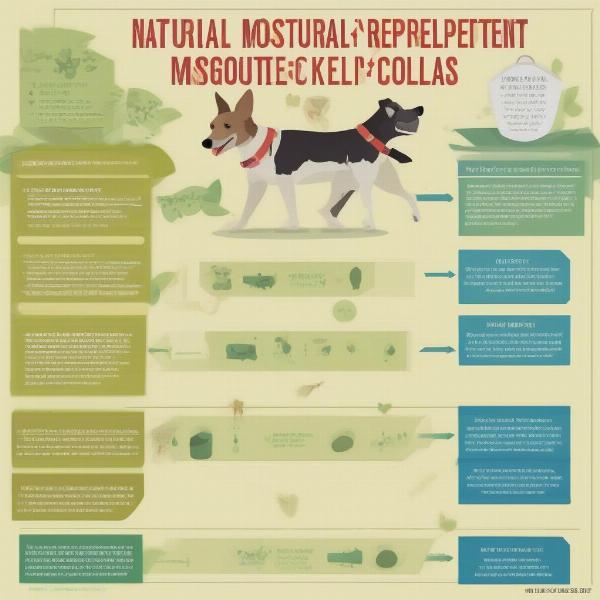Mosquitoes are more than just a nuisance; they can transmit heartworm disease, a serious and potentially fatal condition for dogs. While preventative heartworm medication is crucial, adding an extra layer of protection with a mosquito repellent dog collar can provide valuable peace of mind. This article will delve into the world of dog collars for mosquitoes, exploring their effectiveness, different types, and how to choose the best one for your furry friend.
Understanding Mosquito Repellent Dog Collars
Mosquito repellent dog collars work by releasing substances that deter mosquitoes from biting your dog. These substances can range from natural essential oils like citronella and geranium to synthetic insecticides like permethrin and deltamethrin. Some collars utilize ultrasonic technology, emitting high-frequency sounds that are supposed to repel mosquitoes, although the effectiveness of this method is debated. When considering a dog collar for mosquitoes, it’s important to understand the different types available and how they work. This will help you make an informed decision that best suits your dog’s needs and your preferences.
Choosing the Right Mosquito Dog Collar
Choosing the right dog collar for mosquitoes involves considering your dog’s size, age, health, and lifestyle. For puppies or smaller dogs, adjustable collars are crucial to ensure a proper fit. If your dog has sensitive skin, a collar made with natural ingredients might be a better choice. Always check the manufacturer’s recommendations and consult with your veterinarian before using any new product, especially if your dog has pre-existing health conditions. The right collar should be effective, comfortable, and safe for your dog.
Natural vs. Chemical Mosquito Collars
 Comparing Natural and Chemical Mosquito Collars
Comparing Natural and Chemical Mosquito Collars
Natural mosquito collars often utilize essential oils like citronella, lemongrass, and lavender. While generally considered safe, some dogs may be allergic to certain oils. Chemical collars, on the other hand, contain insecticides like permethrin. These are highly effective but can be harmful if ingested or if they come into contact with a dog’s eyes or skin. Choosing between a natural and a chemical collar depends on your individual circumstances and risk tolerance. If you’re concerned about potential side effects, a natural collar might be a safer option. natural flea and tick spray for dogs can be a good alternative. However, if you live in an area with a high mosquito population, a chemical collar might offer better protection. You may also want to consider the best dog flea and tick treatment uk for comprehensive parasite protection.
Tips for Using Mosquito Dog Collars
- Proper Fit: Ensure the collar fits snugly but not too tight. You should be able to fit two fingers between the collar and your dog’s neck.
- Regular Replacement: Replace the collar as directed by the manufacturer. The repellent effect wears off over time.
- Monitor for Irritation: Check your dog’s skin regularly for any signs of irritation or redness. If you notice anything unusual, consider switching to a different type of collar or consult your vet. scalibor dog collar can be a good option to check.
- Combined Approach: Use a mosquito collar in conjunction with other preventative measures like heartworm medication and removing standing water around your home. If you suspect your dog has parasites, it’s important to know how to know if dog has parasites. Consider applying neocort cream dogs if skin irritation occurs.
Conclusion
A mosquito dog collar can be a valuable tool in protecting your dog from mosquito bites and the potential for heartworm disease. By understanding the different types of collars available and choosing one that suits your dog’s individual needs, you can provide them with an extra layer of protection against these pesky insects. Remember to always consult your veterinarian before using any new product on your dog.
FAQ
- How long do mosquito dog collars last? The effectiveness varies depending on the brand and type, but most collars last for several weeks to a few months.
- Are mosquito collars safe for puppies? Yes, but choose a collar specifically designed for puppies and ensure it fits properly.
- Can I use a mosquito collar on my pregnant dog? Consult your veterinarian before using any new product on a pregnant dog.
- What if my dog swims while wearing a mosquito collar? Some collars are water-resistant, but check the manufacturer’s instructions for specific guidance.
- Can I use a mosquito collar with other flea and tick prevention? Yes, but consult your veterinarian to ensure there are no contraindications.
- Are there any side effects of using mosquito collars? Some dogs may experience skin irritation or allergic reactions. Monitor your dog closely and consult your vet if necessary.
- Where can I buy a mosquito dog collar? Mosquito dog collars are available at pet stores, veterinary clinics, and online retailers.
ILM Dog is your trusted international resource for expert advice on dog care and breeding. We offer comprehensive guidance on everything from breed selection and health care to training, nutrition, and grooming. Our team of experienced professionals is dedicated to providing dog owners worldwide with the information they need to ensure their canine companions live long, healthy, and happy lives. Contact us at [email protected] or +44 20-3965-8624 for personalized advice and support. ILM Dog is here to help you navigate the joys and challenges of dog ownership.